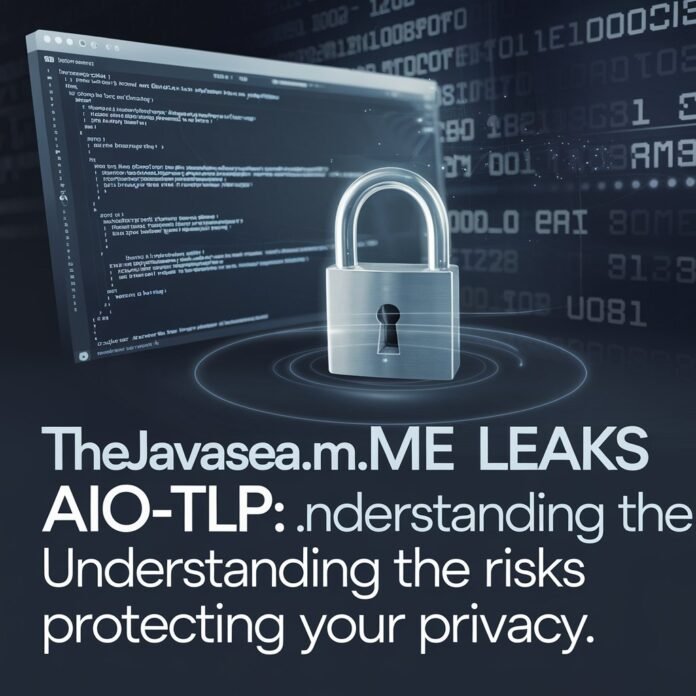Introduction
In recent months, the website “thejavasea.me” has garnered significant attention within cybersecurity communities, particularly regarding the leaked content categorized under “AIO-TLP.” As discussions surrounding “thejavasea.me leaks AIO-TLP” continue to intensify, it is crucial to provide a comprehensive, humanized, and easy-to-understand guide for those in the USA who seek to understand the implications of these leaks. This article will explore what thejavasea.me is, the nature of the leaks, the potential risks involved, and what steps users can take to protect themselves.
Thejavasea.me Leaks AIO-TLP: Recently, cybersecurity enthusiasts have been actively discussing Thejavasea.me, a new website that has gained attention for its involvement in the controversial release of AIO-TLP leaks. These leaks have sparked debates due to the sensitive nature of the information shared, raising concerns about online privacy and security within the community.
Table of Contents
- What is Thejavasea.me?
- 1.1 Overview of Thejavasea.me
- 1.2 Purpose and Functionality of the Site
- Understanding AIO-TLP Leaks
- 2.1 What Does AIO-TLP Stand For?
- 2.2 The Types of Information Leaked
- The Significance of Thejavasea.me Leaks
- 3.1 Why These Leaks Matter
- 3.2 How These Leaks Can Affect You
- Analyzing the Risks
- 4.1 Potential Cyber Threats
- 4.2 Identity Theft and Financial Risks
- Protecting Yourself Online
- 5.1 Best Practices for Online Security
- 5.2 Tools and Resources for Protection
- Legal and Ethical Considerations
- 6.1 The Legality of Accessing Leaked Information
- 6.2 Ethical Concerns in the Cybersecurity Community
- Frequently Asked Questions (FAQs)
- 7.1 What Should I Do If My Information Is Leaked?
- 7.2 How Can I Monitor If My Data Has Been Compromised?
- 7.3 Is It Safe to Visit Thejavasea.me?
1. What is Thejavasea.me?
1.1 Overview of thejavasea.me leaks aio-tlp
Thejavasea.me is a relatively new website that has quickly become a hot topic within online communities, particularly those interested in cybersecurity, hacking, and digital privacy. The site is known for hosting a variety of leaked data, including sensitive personal information and proprietary content from different sources. While the site might appear similar to other leak sites, it has a unique focus on what is known as “thejavasea.me leaks aio-tlp”.
1.2 Purpose and Functionality of the Site
The primary purpose of thejavasea.me leaks aio-tlp is to serve as a repository for leaked content, making it accessible to the public. Users who visit the site can find various types of information, often sorted into categories like “AIO-TLP.” The site’s interface is designed for ease of use, allowing visitors to search for specific leaks or browse through recent uploads. However, the ease of access raises significant concerns about the implications of such information being available to anyone with an internet connection.
2. Understanding AIO-TLP Leaks
2.1 What Does AIO-TLP Stand For?
AIO-TLP is an acronym that stands for “All In One – Traffic Light Protocol.” The Traffic Light Protocol (TLP) is a system used to classify the sensitivity of shared information, commonly employed in cybersecurity. The categories range from TLP(highly confidential) to TLP(publicly accessible information). When combined with “All In One,” it indicates that the leaked content includes a broad spectrum of information classified under various TLP levels, all bundled together.
2.2 The Types of Information Leaked
The information categorized under thejavasea.me leaks aio-tlp can include:
- Personal Data: Names, addresses, phone numbers, and social security numbers.
- Financial Information: Bank account details, credit card numbers, and transaction records.
- Login Credentials: Usernames and passwords for various online services.
- Corporate Data: Internal documents, emails, and proprietary information.
The diversity and sensitivity of the leaked information make these AIO-TLP leaks particularly concerning.
3. The Significance of Thejavasea.me Leaks
3.1 Why These Leaks Matter
Thejavasea.me leaks, especially those under the thejavasea.me leaks aio-tlp category, are significant for several reasons:
- Data Security Breaches: The leaks indicate that multiple organizations have suffered significant breaches, leading to the exposure of sensitive information.
- Potential for Abuse: The availability of such information can lead to a range of illegal activities, from identity theft to corporate espionage.
- Impact on Individuals: For ordinary internet users, the leaks represent a direct threat to personal privacy and security.
3.2 How These Leaks Can Affect You
If your information is part of the thejavasea.me leaks aio-tlp, the consequences can be severe:
- Identity Theft: Cybercriminals can use your personal information to commit fraud or impersonate you online.
- Financial Loss: Leaked financial details can result in unauthorized transactions, draining your bank account or running up debt in your name.
- Loss of Privacy: Even if the information isn’t used for financial gain, the mere fact that your private details are available online can be distressing.
4. Analyzing the Risks
4.1 Potential Cyber Threats
The threats posed by Thejavasea.me leaks extend beyond immediate financial loss. Cybercriminals can use the leaked information to:
- Launch Phishing Attacks: By using personal data, attackers can craft convincing phishing emails that trick you into revealing more information.
- Conduct Social Engineering: Criminals might use the data to manipulate you or others into giving away further information or access to secure systems.
- Targeted Attacks: If you’re part of a specific organization, the leaked information could be used to launch targeted attacks against you or your company.
4.2 Identity Theft and Financial Risks
Identity theft is one of the most common and damaging consequences of such leaks. Once your identity is stolen, it can take years to recover fully, with long-term effects on your credit score and personal reputation. Financial risks include unauthorized transactions, fraudulent loans, and even the sale of your financial information on the dark web.
5. Protecting Yourself Online
5.1 Best Practices for Online Security
To protect yourself from the risks associated with Thejavasea.me leaks, consider the following best practices:
- Use Strong, Unique Passwords: Avoid reusing passwords across different sites. Use a password manager to generate and store complex passwords.
- Enable Two-Factor Authentication (2FA): Adding an extra layer of security to your accounts can prevent unauthorized access, even if your password is compromised.
- Monitor Your Accounts: Regularly check your bank and credit card statements for any unauthorized transactions. Consider using a credit monitoring service.
5.2 Tools and Resources for Protection
Several tools can help you protect your personal information online:
- Password Managers: Tools like LastPass or 1Password can generate and store secure passwords for all your accounts.
- Identity Theft Protection Services: Companies like LifeLock offer services that monitor your identity and alert you to suspicious activity.
- Virtual Private Networks (VPNs): A VPN can help protect your online activity from being monitored or intercepted.
6. Legal and Ethical Considerations
6.1 The Legality of Accessing Leaked Information
Accessing leaked information, even if publicly available, can be legally questionable. In many jurisdictions, knowingly accessing or using such data can result in criminal charges. It’s essential to be aware of the laws in your country and avoid engaging with illegal content.
6.2 Ethical Concerns in the Cybersecurity Community
The release of AIO-TLP leaks on sites like Thejavasea.me raises significant ethical questions. While some argue that making this information public can expose vulnerabilities and drive improvements in security, others contend that it puts individuals and organizations at unnecessary risk. The ethics of leaking and using such data are hotly debated within the cybersecurity community.
7. Frequently Asked Questions (FAQs)
7.1 What Should I Do If My Information Is Leaked?
If you discover that your information has been leaked, take immediate steps to secure your accounts:
- Change Your Passwords: Update the passwords for all accounts associated with the leaked information.
- Enable 2FA: Add an extra layer of security to your accounts.
- Monitor Your Financial Statements: Keep a close eye on your bank accounts and credit cards for any suspicious activity.
7.2 How Can I Monitor If My Data Has Been Compromised?
Several online tools can help you check if your data has been compromised:
- Have I Been Pwned: This website allows you to check if your email address or phone number has been part of a known data breach.
- Identity Monitoring Services: Companies like LifeLock or IdentityForce offer comprehensive monitoring services that alert you to potential breaches.
7.3 Is It Safe to Visit Thejavasea.me?
Visiting sites like Thejavasea.me carries significant risks. The content hosted on such sites is often illegal and can expose you to malware or other security threats. It’s generally advisable to avoid visiting or interacting with these sites altogether.
Conclusion
Thejavasea.me leaks AIO-TLP represent a serious concern for anyone interested in cybersecurity, online privacy, or simply protecting their personal information. The leaked data poses significant risks, from identity theft to financial loss, making it essential to stay informed and take proactive steps to safeguard your information.
By following best practices for online security and understanding the legal and ethical implications of accessing leaked data, you can protect yourself from the potential dangers associated with these leaks. Remember, in the digital age, your personal information is one of your most valuable assets—protect it accordingly.




